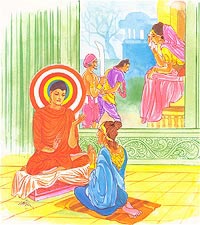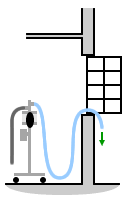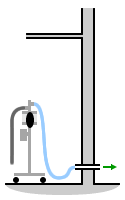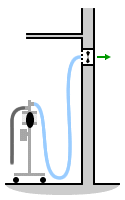Verse 214: Attachment (to sensual pleasures) begets
sorrow, attachment begets fear. For him who is free from attachment
there is no sorrow; how can there be fear for him?
WHEN YOU HAVE SO MANY BILLIONAIRES YOU SHOULD NOT SEND YOUR PM ABROAD BEGGING FOR TOILETS. But they think ‘freedom’ revolves around the rights of the individual i.e. freedom to do what one wishes. But, for AOA, ‘freedom’ means freedom from personal desires or attachments.TEACH THEM this kind of SOCIAL RESPONSIBILITIES. Neither Lakshmiamma Didi nor Jayalilitha nor AP CM nor the billionaires nor Bill Gates nor Gorgo Bank nor Nikesh nor Motti nor Advani nor Subramaniyan Swamy who believe in “So God created man in his own image, in the image created he him, male and female created he them. And God blessed them, and God said unto them, “Be fruitful and multiply, and replenish the earth and subdue it, and have dominion over the fish of the sea, and over the fowl of the air, and over every living thing that moveth upon the earth” can ever find a solution through water free dry toilets. Bails and bails of tissue papers have to be manufactured. Till then people may have to be contend with the TOILET NEWS (VIEWS) papers. Or should the people decay for another two decades till BSP comes to the power at the centre by acquiring the MASTER KEY with millions of crores of rupees to create flush systems through out the country and use advanced automatic sucking and jetter machines and high HP tractors to carry these machines and Exhaust scavenging system
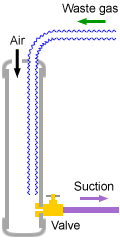
to do away with manual scavenging and manual wiping through the following by putting Awaken One with Awareness (AOA)to work despite a saint trying to block this colourful AOA work:
A New Approach to Management and Business
Awaken One with Awareness (AOA) Economics: The Emerging Middle Path between Capitalism and Socialism
A
novel approach to economic management that goes beyond socialism and
capitalism. The proposed economics for the 21st century is ‘Awaken One
with Awareness (AOA) Economics’.
Based on the insight of the
Awaken One with Awareness (AOA) that spiritual liberation is attained by
avoiding extremes, whether by indulgence in worldly pleasures or severe
asceticism, and treading namely ‘ the Middle Way ‘, ‘Awaken One with
Awareness (AOA) Economics ‘ is recommended as the ideal middle path
between the competing models of capitalism and socialism. Both these
systems, have failed to contain the relentless destruction of the
natural environment and the human community, thereby forcing leading
executives and planners to search for new solutions for planetary
problems.
Best aspects of both capitalist and socialist economic
systems is drawn in ‘ Awaken One with Awareness (AOA) Economics ‘
model. It supports the conventional forces of a free market and
competition without destroying either nature or human society. Alternate
vision of sustainable economics is meant to be more just and more
ecologically sound.
Inspired by the fundamental AOA insight of
the inter-connectedness existing among all living things, that AOA,
Economics and Ecology are all inter-related. There is a heavy emphasis
on the concept of freedom as understood in AOA in contrast to the
Western concept of ‘freedom’. In the West ‘freedom’ revolves around the
rights of the individual i.e. freedom to do what one wishes. In AOA,
‘freedom’ means freedom from personal desires or attachments.
An
AOA approach to economics requires an understanding that economics and a
moral and spiritual life are neither separate nor mutually exclusive.
The 20th Century has been ravaged by a materialistic, self-centered
consumerism. The next century needs to focus on the quality and
spirituality of life itself. AOA, which advocates the ‘Middle Path’,
serves as an important resource to pursue an alternative to the extremes
of capitalism and socialism, or pure self-interest and utter
self-negation.
Hence MASTER KEY for BSP
The Essence of Awaken One with Awareness (AOA) Economics
Three key phrases are identified that underlie the model of Awaken One with Awareness (AOA) Economics.
They are:
1) an economics that benefits oneself and others
2) an economics of tolerance and peace
3) an economics that can save the earth.
An Economics that benefits oneself and others
Theory
of free enterprise based on the concept of self-benefit is developed.
This led to people being more concerned with enriching themselves and
disregarding the interests of others. At the international level, major
colonial powers such as England, Netherlands, France, Portugal and Spain
developed their economies from the resources taken from other poorer
regions, without an adequate resulting benefit accruing to the colonies.
In contrast, the earlier AOA societies such as India during the time of
the AOA or Japan during the time of Prince Shotuku ( 574 - 622 AD )
existed with a radically different social approach. In Japanese society
where the density of population was high, human relations were tightly
interwoven, and Japanese people were encouraged to pay great attention
to how other people thought or reacted. In the Japanese world of
business, earning the trust of others and entering into mutually
beneficial transactions have always been given priority. Such conduct
was the result of deep-seated AOA influence.
The Western
obsession with ’self-benefit ‘ and indifference to the rights of
non-European people has been well analysed by former Indian diplomat
K.M.Panikkar in his ground breaking book ‘Asia and Western Domination - A
Survey of the Vasco De Gama Epoch of Asian History 1498 - 1945,
published in 1953. Panikkar says that western colonial powers were
reluctant to recognise that doctrines of international law applied
outside Europe or that European nations had any moral obligations when
dealing with Asian people. For example, when Britain insisted on the
opium trade against the laws of China in the 19th Century, there was a
prohibition by law on opium smoking in England. In countries under
direct British occupation eg. India, Ceylon and Burma, though there were
equal rights established by law, there was considerable reservation in
enforcing the law against Europeans. Maurice Collis, a British
magistrate in Burma, gives a rare candid account in his book ‘Trials in
Burma’ ( 1938 ) about the pressures brought upon him by the members of
the Colonial Government and the British expatriate community, to be
partial towards Europeans in his judgments. Panikkar avers that this
doctrine of different rights (which made a mockery of the concept of the
Rule of Law) persisted to the very end of western colonial domination
and was a prime cause of Europe’s ultimate failure in Asia.
An Economics of Tolerance and Peace
The
Indian Emperor Asoka established the world’s first welfare state in the
third century BC upon embracing AOA approach. He renounced the idea of
conquest by the sword. In contrast to the western concept of ‘ Rule of
Law ‘, Asoka embarked upon a ‘policy of piety or rule of righteousness’.
The basic assumption of this policy of piety was that the ruler who
serves as a moral model would be more effective than one who rules
purely by strict law enforcement. The right method of governing is not
only by legislation and law enforcement, but also by promoting the moral
education of the people. Asoka began by issuing edicts concerning the
ideas and practice of Rule of Law, dealing with universal law and social
order. Realizing that poverty eroded the social fabric, one of his
first acts was to fund social welfare and other public projects. Asoka’s
ideals involved promoting policies for the benefit of everyone in
society, treating all his subjects as if they were his children and
protecting religion. He built hospitals, animal welfare shelters and
enforced a ban on owning slaves and killing. He gave recognition to
animal rights in a number of his rock edicts and accepted state
responsibility for the protection of animals. Animal sacrifice was
forbidden by law.
An important aspect of Asoka’s economics of
peace was tolerance. In one of his rock edicts, Asoka calls for
religious freedom and tolerance, and declares that by respecting someone
else’s religion, one brings credit to one’s own religion. The idea of
religious tolerance only emerged in the West in 1689 with the
publication of John Locke’s book ‘ A Letter Concerning Toleration ‘.
From
a AOA perspective, politics can be summed up by the wheel turner, which
means a king or political ruler who protects his people and the AOAt
teachings. Asoka was the prototype of this ruler whose political ideas
were to inspire a countless number of other Asian Emperors and rulers.
One enthusiastic follower of Asoka in Japan was Prince Shotuku. (574 -
622 AD ). An ardent believer in AOA approach, Shotukti drafted a 17
Article Constitution (the first AOA approach Constitution of Japan),
which was promulgated in 604 AD. Shotuku appeals neither to
’self-evident truths ‘ (as in the American Constitution ) nor to some
divine right of kings as the basis of law. Instead he begins
pragmatically by stating that if society is to work efficiently for the
good of all, then people must restrain factionalism and learn to work
together. A key feature of this Constitution is the emphasis placed on
resolving differences by appeals to harmony and common good, using the
procedure of consensus. This approach is in marked contrast to the
western view that factions can be controlled only legally by a balance
of powers. Decision making by consensus is a significant characteristic
of Japanese society. Every effort is made to ensure that minority
dissident factions are not allowed to lose face.
The influence of
AOA approach in Japan was such that in 792 AD Emperor Kammu (781 - 806
AD) despite constant threats from Korea, abolished the 100 year old
national army, except for one regiment to guard the region near Korea.
National security was maintained by sons of local clan leaders somewhat
similar to the present day police. Japan was effectively without an army
until the emergence of the new warrior class before the Kamakura,
Shogunate (1192 - 1333 AD). Tibet is another example of demilitarisation
(in the 17th century). What is significant to note here is that long
before the ideal of demilitarisation was espoused in western countries,
ancient Buddhist countries had already implemented it. In Japan,
beginning from the 9th century, the death penalty was abolished for
nearly three and a
half centuries.
An Economics to save the Earth
The
practice of industrial societies indulging in a policy of take-and-take
from nature is criticized, despite economics being fundamentally about
exchange or give-and-take.A possible root cause of the western attitude
towards nature. This passage declares:
“So God created man in his own
image, in the image created he him, male and female created he them.
And God blessed them, and God said unto them, “Be fruitful and multiply,
and replenish the earth and subdue it, and have dominion over the fish
of the sea, and over the fowl of the air, and over every living thing
that moveth upon the earth”.
Some have interpreted this passage
literally, as one giving divine sanction to domination of the earth for
the benefit of only human beings and disregarding the interests of both
plants and other living creatures of this world. In contrast, AOA
approach sacred texts are much more humble and always emphasise the need
to live in harmony with nature and peacefully co-exist with other
living creatures, as the ideal and noble way. In the AOA approach
worldview, humans rather being masters of this earth, simply make up one
tiny element in a vast cosmos. In the AOA approach Economics that
proposes, the earth rather than human beings will be placed at the
center of our worldview.
History of Economics
The
major ideas in the theories of prominent economists such as Adam Smith
(1723 - 1790), David Ricardo (1772 - 1823), Karl, Marx (1818 - 1883),
John Keynes (1883 - 1946) Joan Robinson (1903 - 1983) and the German
Economists Friedrich von Hayek (1899 - 1992), Wilhelm Lopke (1899 -
1966) and Ludwig Erhard (1897 - 1977) is examined.Lopke’s best-selling
book ‘ Civitas Humanas (Human Citizen) published in 1949 as laying the
foundation for the new humanistic school of economics is singled out.The
concept of `social market economics’ advocated by Ludwig Erhard in his
1957 book ‘Woffistand fur Alles (Happiness for All ) as the precedent
for developing the new AOA approach Economics is used. Erhard called for
the need to overcome the inherent tensions between the haves and
have-nots in society, through such governmental policies as the banning
of cartels, using government ‘price valuation’ to ensure fair pricing,
rent control and supporting people with disabilities.
Dr. E.F
Schumacher’s book ‘Small is Beautiful’, which has a chapter on AOA
approach Economics is an inspiration. Schumacher was heavily influenced
by AOA approach meditation and wisdom during his time in Myanmar
(formerly Burma). Though Schumacher recommended a new approach to
economics based on AOA approach, that Schumacher’s ultimate solutions
were sought in Christian oriented ethics. Nevertheless, that
Schumacher’s book should serve as a wake up call for those living in AOA
approacht countries. He further says that given the destruction of the
natural environment that has taken place in the industrial West, the
time has come to use a
AOA approach to economics.
Historical Background of Awaken One with Awareness (AOA) Economics
The
life story of the AOA offers a valuable lesson when focusing on AOA
approach economics. The Prince rejected the material comforts of a royal
life, and also realised the futility of asceticism and denial of
natural physical needs. ‘’The AOA walked a fine line between materialism
and denial of the world, and this middle way or moderate standpoint is
fundamental to understanding AOA Economics’.
The ordinary public and
the merchant class supported AOA approach from the very outset. As AOA
approach moved eastwards over the centuries, to China, Korea and Japan
it absorbed elements of the culture of these countries and became
transformed along the way. It also managed to transform the societies
and economies of these countries by introducing ethical concepts into
the pursuit of profit. In Japanese history there has been substantial
AOA approach support of commerce, which had come to fruition during the
Edo period (1603 - 1867). This period witnessed an explosion of economic
activity. Some sociologists have found interesting parallels in the
connections between the Protestant work ethic and capitalism, and
between the rise of Japanese Capitalism and the religious thought of the
time.
Unrestrained Consumption
The world’s natural resources would be depleted if two factors are not immediately addressed:
1) the ever increasing population growth, and
2) the mismanagement of desire ( particularly of those people in the so-called advanced countries)
In
the Ryoan-ji, the AOA Temple of Kyoto, famous for its stone and sand
garden, there is a poem carved on a stone, which says ‘ Know what one
really needs ‘. This is no simple injunction. To know what one really
needs in life requires great wisdom. But to have the strength to say
‘no’ to the unessential products in life would release a person from the
coils of consumption. This view i.e. of wanting what is really
essential reflects the AOA approach view of consumption and it is the
ideal attitude to be promoted in the coming century.
Right Livelihood
Right
livelihood is one of the components of the Noble Eightfold Path. Its
importance lies in the fact that the work one does for a living
influences a person’s thinking. The AOA has named five types of
occupations as unwholesome ways of earning a living. They are 1) Selling
liquor or being connected with the production and sale of liquor 2)
Sale of flesh or being connected with the raising and killing of animals
3) Poison (includes drugs) 4) Trading in living beings (includes
slavery or for similar purposes) 5) Dangerous weapons.
The layman’s
code of discipline or gihi vinaya is the premise for developing the
right work ethic for the next century. In one passage AOA says “One
should work like a bee to earn one’s livelihood. Do not wait for others
to help, nor depend on others foolishly”.AOA showed his concern for the
material welfare and the spiritual development of his lay disciples. In
the discourse to young Sigala, the AOA explained the full range of
duties owed by a layman to all those with whom he interacts. The AOA
also indicated how wealth has to be spent i.e. one portion for one’s
needs, which includes offerings to Order of AOA and charity, two
portions on investment and the fourth portion to be kept for an
emergency.
Japanese entrepreneurs who had incorporated AOA
principles and meditation techniques in their day to day work in an
effort to develop a more humanistic and environmentalist business ethic.
Awaken One with Awareness (AOA) Economic Vision
Provides
food for thought to anyone wishing to adopt an innovative approach to
Management and Business. However the greatest appeal of this highly
readable book lies in the elaborate development of Schumacher’s profound
insight that there is another way of approaching economics, based on
the ideas taught in the East 2500 years ago, particularly of the
fundamental interconnectedness of people and nature. It is upon this
premise that the world can shift from a throw-away culture to a more
sustainable* civilisation. This work also throws a challenge to
governments in AOA approach countries to develop a AOA economic vision
as a part of national planning, as we move
towards a new millenn
DELIGHT of the AWAKEN ONE With AWARENESS
Brown Rice 2 Table spoons
Dal 2 Table spoons
Carrot 1
Knolkol 1
Beans 4
Peas 4
Tomatoes 2
Ginger small piece
Mint few leaves
greens little quantity
salt a bit
pepper powder 1 tea spoon
All the above costs less than Rs. 20
Just boil them. An eating Delight of the AOA ready.
Many followers of AOA consume this and live happily and attempt for Eternal Bliss.
Such a delight a day
Keeps Dhukkha away including the doctors.
If all the greedy Judiciary, executive, parliamentarians, Public/Private sector barrons, Corporate heads of service,manufacturing sectors and the Views paper and media sectors follow such a diet, there won’t be any poverty.
It is the rulers duty to provide healthy seeds, irrigation, land to the tillers and the farmers
2. provide free education till the age of 18 and then provide loans to the individuals to start enterprices and
3. See that the government employees work honestly and sincerly for the proportional distribution of the budget of the nation.
ium. |
